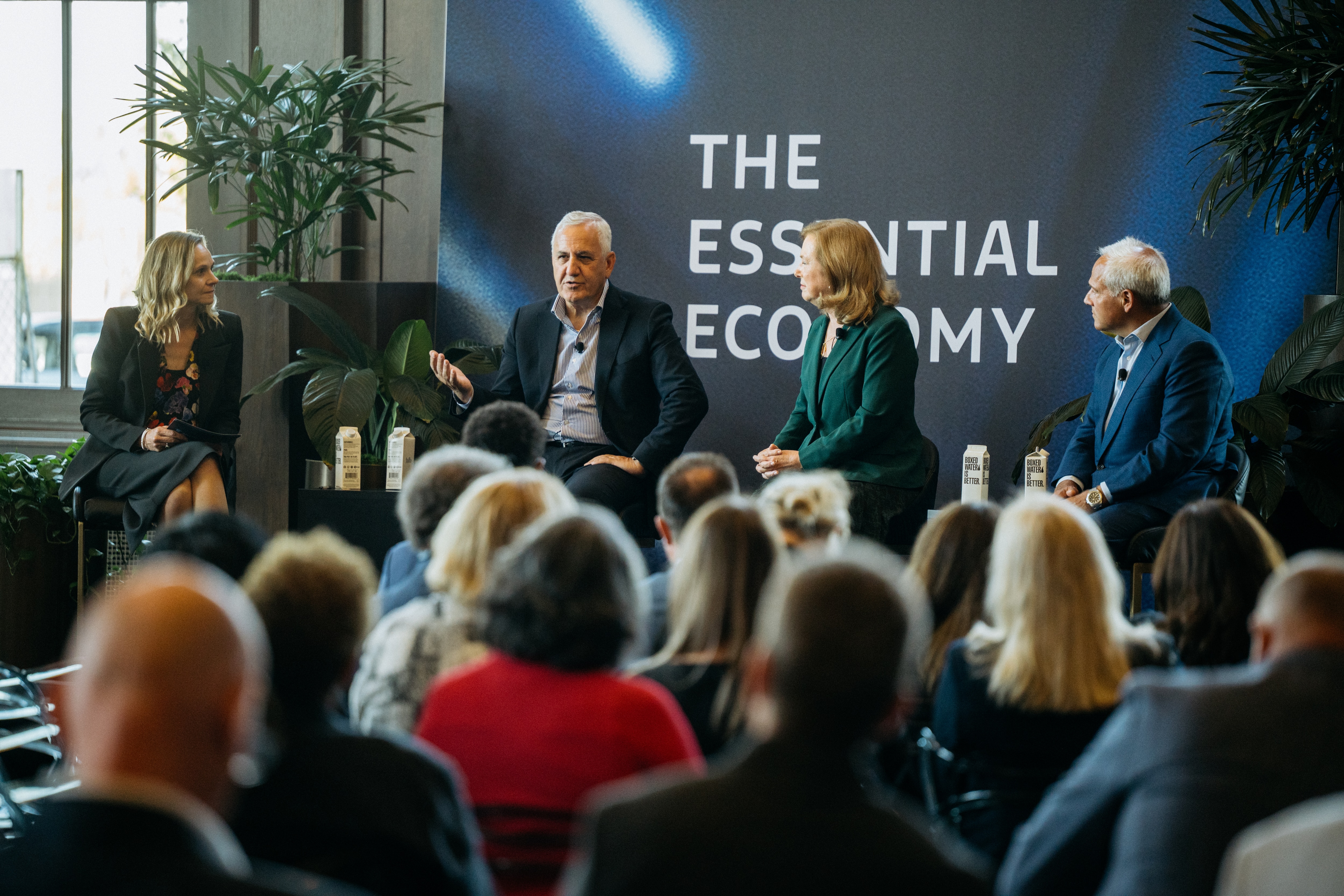
A New Agenda to Power America’s Essential Economy



Ford President and CEO Jim Farley and fellow business leaders hosted the first national conversation on the Essential Economy — the 3 million businesses and critical industries that keep America running— on Sept. 30. Below are highlights in the From the Road live blog.
5:15 p.m.: Mike Rowe Warns Failure to Support Essential Economy Will Have Consequences
Mike Rowe, CEO of mikeroweWORKS Foundation, says the economic cost of ignoring the Essential Economy could be “complete and total devastation.”
“I’m most struck by the math here: for every two who come in, five leave the trades,” Rowe said during a panel hosted by Ford President and CEO Jim Farley. “And it is not just about plumbers and electricians and construction workers. The shipbuilding industry needs 250,000 tradesmen.”
With hundreds of thousands of unfilled manufacturing jobs in America, a blue-collar employment boost won’t come overnight. In fact, Rowe said most of the future Essential Economy workers haven’t even reached working age yet.
“Do you know where those workers are? They’re in the eighth grade, right now, and if you want to influence those kids on career choices, you start doing that right now,” he said.
“We have to make sure the diversity of educational options is right and that everybody is at the table.”Lori Chavez-DeRemer, United States Secretary of Labor
But Lori Chavez-DeRemer, United States Secretary of Labor who was also part of the panel, made clear the federal government knows the U.S. can’t wait for years to address the Essential Economy labor shortage.
“We’re up against a timeline,” she said. “We have to make sure the diversity of educational options is right and that everybody is at the table.”
3:36 p.m.: Financially Empowering Essential Workers and Businesses
Thasunda Brown Duckett, President and CEO of TIAA, and Cathy O’Callaghan, President and CEO of Ford Credit stressed the need to financially empower Essential Economy workers and businesses.
“We need to understand the roadblocks for individual workers and make sure they have the tools for financial security and a dignified retirement. Currently 40% of Americans risk running out of money in retirement, and 67% of people during the last serious round of inflation had defined benefit access, pensions, but that number is now 12%,” said Brown Duckett. “We have to address the savings gap, making sure workers have livable wages, education.”
Education extends not just to the workers, but also to the owners of the business who employ the workers.
“On the ownership side, many of our essential businesses are headed by people extremely skilled in their craft,” O’Callaghan said. “But they may not have the financial education to truly unlock their own potential. Only 15% of new business lines of credit are approved. We have opportunities to grow and educate those individuals. Putting owners in touch with trade organizations, teaching people how to write a business plan, accessing resources that already exist. This is how you create literacy and generational wealth.”
2:15 p.m.: Innovation Needs to Expand Throughout the Entire Country, Experts Say
Closing the Essential Economy gap requires more than a single solution. It requires an ecosystem of collaboration and innovation and it can’t be confined to only small areas of the country, according to a panel of experts.
Bigger companies need to partner with smaller ones while fostering a permissive environment for testing and learning, said Rachel Holt, co-founder and general partner at Construct Capital.
“The best thing we can do to help innovate in these sectors is to be willing to partner with startups,” she said.
One example of both trends converging is in Detroit, where its growing mobility hub is an example of uplifting startups in a geographically diverse area.
“You've got to create the environment in which people want to come .... It feels like we're building it. We're trying to change the atmosphere of the city. ”Detroit Mayor Mike Duggan
“You’ve got to create the environment in which people want to come,” said Detroit Mayor Mike Duggan. “We’ve got the University of Michigan grad school specializing in AI down the street, Google running training out of here, [Michigan Central], and Black Tech Saturday. It feels like we’re building it. We’re trying to change the atmosphere of the city.”
2:03 p.m.: Essential Economy Requires Supply Chain Resilience
One key to supporting the Essential Economy is supply chain resilience that takes learnings from the past and couples them with predictive analytics to forecast the future, according to a group of experts at the Ford Pro Accelerate conference.
Liz Door, Ford chief supply chain officer, moderated a workshop entitled Supply Chain Resilience: Solutions that Deliver, a panel that included Thomas Caulfield, Executive Chairman, GlobalFoundries; Jim Vena, CEO, Union Pacific; and Barbara Humpton, CEO, Siemens USA.

Vena said at Union Pacific, “our business is an outdoor sport, any day now we’re going to start getting up to 800 inches of snow in the Donner Pass, in the south temps reach well into the triple digits, then there are tornadoes and hurricanes, those are known variables that are uncontrollable.
“The challenge is that you know those things are coming but so you anticipate those things, you build a buffer intelligently. You use predictive technologies to be as lean as possible but also reduce risk.”
Supply chain resiliency today is advanced by learnings from the COVID-19 pandemic.
“First it was the complexity of it all, people just weren’t aware of it,” Caulfield said of that period. “Second is deliverability, we do just in time delivery as much as we can and make production linear, but I’ve seen companies revisit this notion just so we don’t find ourselves in this crunch again.”
Door said empowering suppliers to use the latest technologies to innovate is a way to further strengthen supply chains.
12:10 p.m.: Government, Business Need Creative Approach to Accelerating Industry, Says Michigan Gov. Whitmer
“Government and business need to work hand in glove to ensure American industry has every possible advantage,” Michigan Gov. Gretchen Whitmer said during a discussion with journalist Poppy Harlow. “China has built an impressive economy using a combination of incentives and regulations. The U.S. must remain vigilant and approach this challenge with equal creativity.”
Whitmer emphasized the importance of this collaboration given the transformative impact of artificial intelligence, which is already reshaping employment and business landscapes.
“Just look at auto jobs from 50 years ago — those roles look vastly different today,” she said. “AI will transform them yet again. We need to take the reins, stay agile, and grow with it.”
Asked whether the U.S. could benefit from a modern-day version of the Works Progress Administration to support the Essential Economy, Whitmer said she’s strongly in favor.
“The reality is that, for many Americans, just a few thousand dollars’ worth of training can be the difference between stagnation and success.”Michigan Gov. Gretchen Whitmer

“We’ve created several programs here in Michigan to boost skill development, and many people have taken advantage of them,” she said. “The reality is that, for many Americans, just a few thousand dollars’ worth of training can be the difference between stagnation and success. We can — and should — address that.”
11:57 a.m.: Improving Productivity Starts with Modernizing Workforce, Regulations
“There are massive opportunities in software-enabled skilled trades, data center creation, and reinvesting in our infrastructure and we’re just getting started in that future,” said Daniel Peyovich, President and CEO, Dycom Industries.
David Burritt, president and CEO of U.S. Steel, said that modernization won’t always be easy, but it’s a necessity to improve productivity over the long run.
“We’re in a moment of significant change and we will stumble, but we have to do that fast and iterate,” Burritt said. “I could not be more optimistic about the future of this economy.”
Also key to improving productivity is modernizing regulations.
“The biggest issues are permitting and tort reform,” said Roger Penske, founder and chairman at Penske.
“The permitting issue really slows us down and slows down how we can advance our business. Tort reform drives up costs considerably, we have huge insurance accounts just to cover the possibility of a massive legal payout. If we can address these things we open up far more opportunity for us and for growth.”
11:45 a.m.: Jim Farley: U.S. Losing Ground with Essential Economy Investments
Jim Farley, President and CEO of Ford Motor Company, kicked off the inaugural Ford Pro Accelerate conference at Michigan Central Station.

“We’re here to honor the people who work with their hands,” he said. “We’re here in the magnificent Michigan Central Station, and it’s appropriate. We rebuilt this — not with money, but with skills. This place was left derelict for four decades, and it was skilled tradespeople, craftsmen and women, who solved the problem. It was the right thing to do, but we collectively need to have the will to do it.”
Farley continued: “We hear every day from our Ford Pro customers who say they’re suffering from staffing shortages — and that’s what we’re here to talk about today. One of the biggest issues is getting people into essential economy jobs and then retaining them.”
He noted that blue-collar productivity has stagnated in recent decades, while white-collar roles have seen large gains — and that imbalance needs to be addressed head-on.
“The problems with the essential economy are problems for all of us,” Farley said. “What happened to the essential economy? We outsourced a lot of skills and jobs. We stopped investing in the trades. If Henry Ford saw what has become of us, I think he’d be kind of mad.”


Farley emphasized that investment in the essential economy in the U.S. is among the lowest in the world.
“One of the biggest barriers is the hesitancy to enter these trades, because as a society, we don’t really reward or celebrate the people who take on these kinds of jobs,” he said. “We can’t rely on government to fix it. We can’t just rely on business or communities. It has to be a cooperative effort.”
Later, David Westin of Bloomberg asked Farley where the U.S. stands globally in terms of apprenticeships and training.
“When my team and I travel to places like Germany, China, and Korea, we see that we’re pretty far behind,” Farley said. “They get it. What they do is invest. If anything comes out of today, it’s this: we need to figure out how to invest in the people who build things.”
“If anything comes out of this today, it's this: we need to figure out how to invest in the people who build things.”Jim Farley, Ford CEO
What’s the biggest thing holding back the Essential Economy that Farley would communicate to government officials?
“Permitting,” he said. "I know it’s not sexy, but so much of the Essential Economy is mired in red tape, it takes forever to get things approved. States that have addressed their permitting process are seeing tremendous growth. Second is education. We have to invest in education at every level of skilled trades and I think Ford can and is doing a lot to help ourselves but we as a country are not doing enough.”